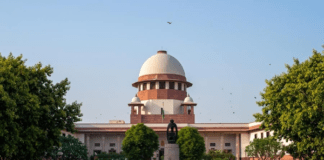The Supreme Court held that there is no right to government employment under the Land Acquisition Act; compensation fully satisfies the State’s obligation.
The Supreme Court has clarified that the Land Acquisition Act does not grant any right to employment in exchange for acquired land, ruling that compensation alone fulfills the State’s duty.
In a significant ruling reaffirming the boundaries of the State’s obligations under the Land Acquisition Act, 1894, the Supreme Court of India has held that landowners or their legal heirs are not entitled to government employment merely because their land was acquired for public purposes. The Court observed that monetary compensation under the statute is a complete and final discharge of the State’s liability, and no further benefit — such as employment — can be claimed unless explicitly provided by law or a specific policy.
The decision came while dismissing a special leave petition (SLP) filed by an individual seeking a government job nearly three decades after his family’s land had been acquired. The Bench, comprising Justice Pankaj Mithal and Justice Prasanna B. Varale, delivered a reasoned judgment that underscores the limited scope of the Land Acquisition Act in matters of post-acquisition entitlements.
The Background
The case originated in Punjab, where the petitioner’s family land was acquired in 1998 by the government for a public project. The acquisition and compensation proceedings were completed under the Land Acquisition Act, 1894 — the law governing compulsory acquisition before the 2013 reforms.
In 2025, the petitioner, who was not even born at the time of the acquisition, filed a petition before the authorities claiming employment on compassionate grounds, asserting that his family had lost their livelihood due to the land acquisition. He contended that as the acquisition benefitted the State, the government had a moral obligation to offer him a job.
When his claim was rejected, he approached the High Court, which dismissed the plea. He then moved the Supreme Court, urging that the right to livelihood and equitable justice warranted a sympathetic interpretation of the Land Acquisition Act.
The Supreme Court’s Reasoning
The Supreme Court found no merit in the plea. It held that the Land Acquisition Act, 1894 is a self-contained code that provides for payment of compensation as the only statutory remedy to landowners whose property is acquired.
“The statute does not provide for employment or rehabilitation as a matter of right,” the Court observed. “Once compensation has been paid and accepted, the obligation of the State stands fully satisfied.”
The Bench clarified that any claim for employment cannot be implied from the acquisition process itself. Such benefits can only flow from specific government policies framed to address rehabilitation or employment of displaced persons — for instance, in large-scale industrial or infrastructural projects.
Citing precedents such as State of M.P. v. Narmada Bachao Andolan and Union of India v. Chajju Ram, the Court reiterated that a court of law cannot create a right where none exists in the statute. It emphasized that judicial sympathy cannot override express legislative provisions.
On the Claimant’s Locus and Timing
Another critical factor noted by the Court was that the petitioner was not born at the time of the acquisition and therefore had no legal standing to claim personal loss or deprivation. The claim for compassionate employment was made nearly 27 years after the acquisition, which, the Court said, “demonstrates an attempt to revive a long-settled matter.”
The Bench held that compassionate appointment, as a rule, is meant to mitigate immediate hardship caused by the death of a government employee or similar exigencies — not to provide long-term benefits linked to land acquisition.
Broader Implications
This ruling provides clarity in a field where many similar claims continue to surface across India, especially in states with extensive public development projects. Several families displaced by older acquisitions often seek employment or rehabilitation benefits, arguing moral entitlement.
However, the Supreme Court’s decision underscores that such benefits must emanate from an explicit policy, not judicial extension of statutory language.
Legal experts note that the judgment aligns with the principle that “statutory compensation is final and exhaustive” unless specific rehabilitation or resettlement schemes are framed under separate executive policies — as seen later in the Right to Fair Compensation and Transparency in Land Acquisition, Rehabilitation and Resettlement Act, 2013 (RFCTLARR Act).
While the 2013 Act introduced rehabilitation and resettlement benefits, including potential employment assistance in certain cases, the 1994 acquisition in this case was governed entirely by the earlier statute, which contained no such provisions.
Judicial Consistency and Precedents
The ruling is consistent with previous decisions where courts refused to extend benefits not envisaged under the law. In State of Bihar v. Dhirendra Kumar (1995), the Court held that once compensation is accepted, the landowner’s rights are extinguished. Similarly, in Delhi Development Authority v. Joginder S. Monga (2004), the Court emphasized that land acquisition is a sovereign act governed strictly by statutory provisions.
Thus, the Supreme Court’s stance in the present matter reaffirms that the right to employment cannot be imported into the statutory framework of the Land Acquisition Act, however sympathetic the individual circumstances may be.
Conclusion
With this judgment, the Supreme Court has drawn a firm line between statutory compensation and moral expectations of employment arising from land acquisition. The decision serves as a reminder that while the State may adopt rehabilitation policies as a matter of welfare, courts cannot rewrite the law to create new entitlements.
For comprehensive coverage of similar legal developments, visit The Legal Observer’s national news section and explore expert commentary in our Views & Insight section. For related video discussions, subscribe to The Legal Observer’s YouTube channel.





